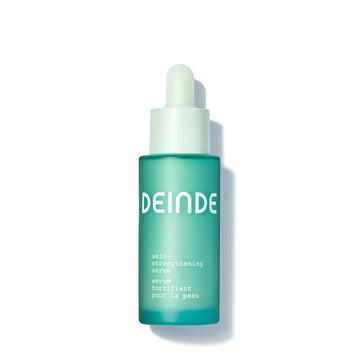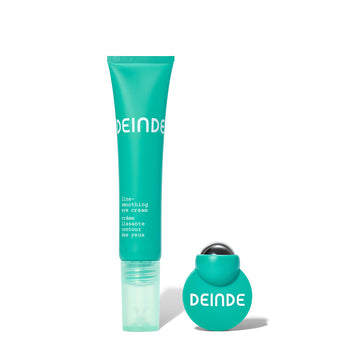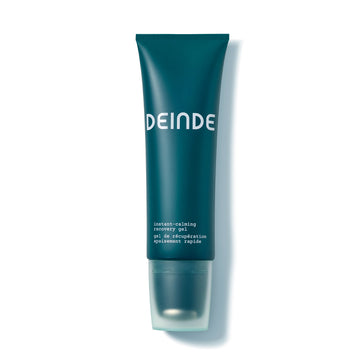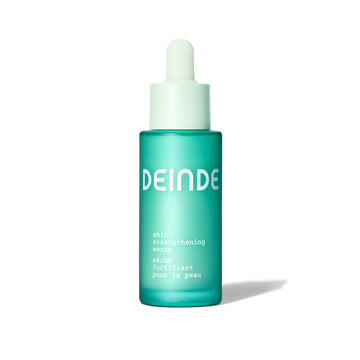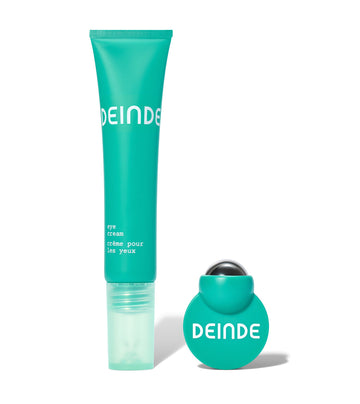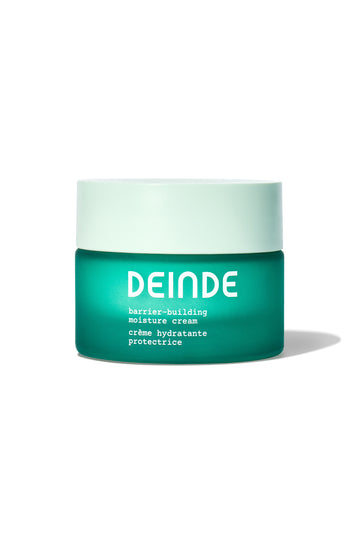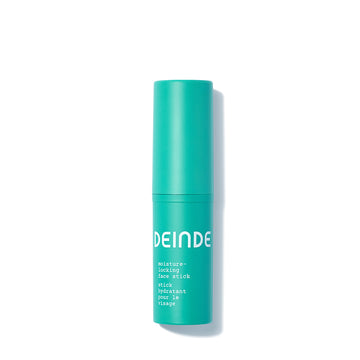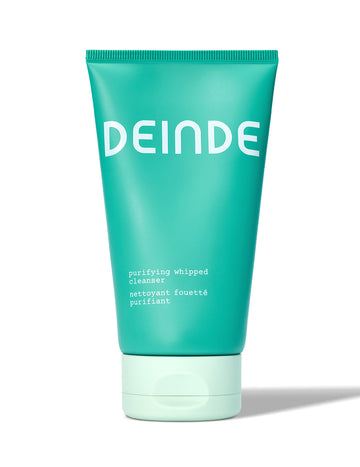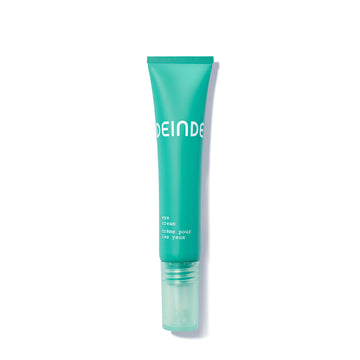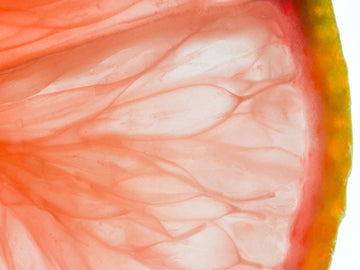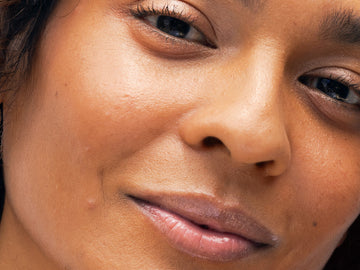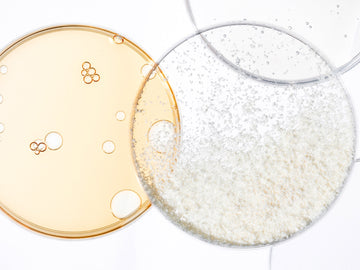
Skin Science: Naringenin
If you were to peruse the aisles of your beauty stockist of choice — say Sephora — and really look at the ingredients, you’d notice that the beauty industry loves its tried-and-true actives. Think the Vitamin C’s, the alpha-hydroxy acids, the niacinamides of the world. While these ingredients have been proven to be effective and have garnered cult followings (we’re looking at you, retinol), we’re aware that there is somewhat of a stagnation in skincare active innovation.
Enter Naringenin, a novel biotech bioactive compound within the flavonoid group. Commonly found in the skin of citrus fruits like grapefruits, oranges, and lemons, this citrus flavonoid is well known for its antioxidant, anti-inflammatory, and anti-carcinogenic properties.
Naringenin is DEINDE’s hero ingredient due to its unmatched ability to support skin against the detrimental impacts of inflammaging. Complex as it is impactful, we’re planning on bringing biotech-based Naringenin (and additional novel cosmetic active ingredients) to market through biotech innovation. It all starts with DEINDE.
What Is Naringenin?

Naringenin is one of the most abundant naturally occurring flavonoids.
The flavonoid Naringenin is traditionally sourced from a range of citrus fruits and byproducts through the isolation of Naringenin from juice or peel, then the application of solvent extraction, chromatography, or filtration. Once processed, it appears as a pale-yellow powder. Specifically, Naringenin has a molecular formula of 15 carbon atoms and a melting point of 251.0 °C — important points to consider when formulating. We formulate it by pre-dissolving this powder under mild heat and then adding the solution to product emulsions.
Outside of the skincare world, Naringenin even shows promise as an oral supplement. Some research suggests that supplementation with Naringenin may have promising results in combating issues such as obesity and cardiovascular problems. It plays a role in lipid modulation and supporting healthy levels of low-density lipoprotein, serving as an essential part of a dietary regimen against metabolic disorders.
Why Naringenin?
There’s been a continuing body of research as well as in vivo and in vitro assays (47+ clinical studies) on Naringenin that show it is a safe and efficacious molecule for skin application, and it may even have protective effects.
This active ingredient stood out from the beginning for team DEINDE and our parent biotech firm Debut. We spent a substantial amount of time exploring a variety of skincare actives to research and biomanufacture — with Naringenin as a clear path forward.
Naringenin is acknowledged to be difficult to extract and stabilize. It takes a substantial amount of effort and resources to transform grapefruit into an efficacious and abundant active ingredient. Beyond physical transformations into a usable active, Naringenin requires significant land and water for grapefruit groves.
Debut’s Naringenin is notable because we can create, in the lab, the levels of active ingredients needed to deliver inflammaging-specific results without relying on large swaths of land and water. A biotech approach not only allows for an economically and environmentally viable alternative to a resource-intensive supply chain but also assures active stability and efficacy.
We conducted a variety of Debut pre-clinical assays and clinical trials to deeply understand if it would be a viable active ingredient to introduce to our customers in our natural products. Note that Debut Naringenin is gentle for even the most sensitive of skin, passing HRIPT with a sensitive skin panel, showing no signs of causing allergic or irritation reactions in skin.
Here’s what we learned from initial internal research into Naringenin’s beneficial effects:
→ Naringenin is 15x more powerful than the leading comparable active
Results: Naringenin decreased IL6 by 96% and TNFα by 78% when used at an on-skin equivalent of 0.45%. Both inflammatory markers were essentially returned to the same level as unstressed cells.
→ Naringenin shows a 10+ fold change over 7 genes that strengthen the skin barrier and protect from inflammaging
The Debut lab team, armed with know-how about biochemistry, modeled healthy skin in vitro to understand the relationship between Naringenin and a collection of genes. They found that Naringenin upregulates genes that support skin barrier maintenance while encouraging the downregulation of inflammatory genes.
This is a substantial amount, as most skincare actives show simply a 1-to-2-fold change, while Naringenin shows a 10+ fold change.
Biotech x Naringenin
While Naringenin, a citrus flavanone, is exceptionally beneficial for interrupting inflammaging, it carries a substantial land and water impact. Based on an internal case study using comparative data for Debut Naringenin vs. Naringenin cultivated from grapefruits, we found biomanufactured Debut Naringenin uses:
- 99.6% less water
- 99.9% less land
- No pesticides
Note that the above numbers were case studies carried out using Naringenin cultivation from grapefruits vs. a standard Debut bio fermentation process. A full life-cycle assessment will be conducted in 2024.
In addition to substantially decreasing the environmental impact of ingredients, biotech allows for faster processing time and higher levels of consistency. This approach also meets rigid clinical standards. Biotech manufacturing solutions, in general, offer something that the beauty and skincare industry desperately lacks: supply chain transparency and standard ingredient quality. Where the industry sits now, many products claim to contain botanical extracts and organic compounds, but without robust traceability, it’s difficult to confirm claim accuracy and active content levels.
How Does Naringenin Reduce the Impacts of Inflammaging?
Inflammaging refers to chronic, low-level inflammation. Driven by factors like oxidative stress, cellular damage, and the accumulation of senescent cells, inflammaging is recognized to accelerate the aging process.
As we age, our cells reach a state of senescence, a gradual deterioration, that makes them prone to inflammation damage. When skin is chronically inflamed, cellular senescence is accelerated, a process involving impaired DNA transcription. Along the same aging timeline, our body's ability to resolve inflammation reduces, causing an imbalance between proinflammation and anti-inflammation. This is where inflammaging manifests, a pro-inflammatory state recognized to accelerate aging and related diseases.
What is Inflammaging?
When considering the best ingredients to target inflammaging, Naringenin stood out due to how well its capabilities aligned with the signs of inflammaging. From reducing inflammation markers like IL-6 and TNF-α to supporting the secretion of beneficial enzymes to supporting cell health during exposure to free radicals, you’d be hard-pressed to find a better match for interrupting inflammaging than Naringenin. Here's why we love it:
→ It's a Potent Antioxidant
A potent antioxidant polyphenol, Naringenin is known to support skin cell health during exposure to free radicals in the body.
Free radicals, highly reactive molecules, damage the skin through oxidative stress. Oxidative stress is known to occur when there is an imbalance between antioxidants and free radicals — essentially, free radicals act as reactive molecules that seek out solo electrons, causing instability. To simplify this concept, free radicals are like electron thieves, causing a damaging chain reaction.
Naringenin steps in yielding its complex processing of safeguarding cells, interacting with iron and copper ions to support the body’s natural ability to get rid of free radicals and reactive oxygen species. FYI, Naringenin can do this because it has two hydroxyl groups at position 5 +7, and a carbonyl group at position 4 of the c ring.
→ Anti-Inflammatory
Through a range of molecular mechanisms, Naringenin may help support the proper functioning of inflammatory pathways. Specifically, Naringenin is known to interact with the NF-kB pathway, which stimulates pro-inflammatory genes.
Naringenin also helps support the body’s natural ability to regulate levels of pro-inflammatory cytokines (IL-6, TNFα, etc.) by reducing their release from immune cells.
→ Collagen Production
A lack of collagen is an indicator of stressed, aging skin. Naringenin steps in to support production through a range of methods. From supporting the gene expression and production of TGF—β, a signaling molecule for collagen synthesis, to interacting with matrix metalloproteinases (which breaks down collagen in the skin), Naringenin is exceptionally supportive.
In a 2023 study, Naringenin was shown to help promote the proper activation of fibroblasts — these are specialized cells that produce collagen. Naringenin is additionally believed to support cellular signaling pathways specific to collagen production by maintaining the health of a number of pathways critical to collagen synthesis. These include PI3K/AKT (promotes the expression of collagen-related genes), MAPK/ERK (upregulates collagen genes), and TGF-β (activates downstream signaling pathways). Debut, of the DEINDE family, found that Naringenin has an inhibitory effect on elastase activity to maintain the integrity of the skin’s extracellular matrix and prevent the appearance of aged skin.
→ Skin Barrier Support
As a reminder, the stratum corneum (outermost layer of the skin) is where the lipid barrier exists. Naringenin, applied topically, supports the proper synthesis of key lipids — think ceramides, free fatty acids, etc. — that help seal in moisture and provide stability to the skin barrier.
Research shows that Naringenin can support the healthy formation of seals between skin cells, which reduces skin barrier permeability. This means that the barrier is adequately resistant to external substances and maintains ideal hydration levels. Naringenin is also known to support the proper expression of filaggrin — higher levels of this protein enhance natural moisturizing factors in the skin.
→ UV Protection
When skin is exposed to UV radiation, it generates reactive oxygen species (ROS)— these are harmful molecules that cause oxidative damage and encourage premature aging.
Naringenin can help combat the effects of ROS in a number of ways: free radical support, metal chelation, and enhancing endogenous antioxidants.
- Free radical scavenger → Naringenin contains multiple hydroxyl (OH) groups that are able to donate electrons to unstable free radicals — increasing stability
-
Metal chelation → Naringenin binds to metal ions like copper and iron — essentially locking up the formation of reactive oxygen species
- Endogenous antioxidants → Naringenin promotes endogenous antioxidant enzymes that are able to break down free radicals into less volatile molecules
DEINDE sees Naringenin’s unique combination of skin health promoting properties as an all-in-one active — offering everything from hydration, to soothing and supporting youthful-looking skin, to encouraging firmness and elasticity. Clinically proven, Naringenin is just the beginning of the Debut ingredient portfolio.
Studies cited:
- Naringenin: A flavanone with anti-inflammatory and anti-infective properties | ScienceDirect
- Cyclooxygenase-2 inhibitors modulate skin aging in a catalytic activity-independent manner | NIH
- Naringenin: an analgesic and anti-inflammatory citrus flavanone | NIH
- Antioxidant Potential of Narigenin Helps to Protect Liver Tissue from Streptozotocin-Induced Damage | NIH
- Protective Effects of Naringenin against UVB Irradiation and Air Pollution-Induced Skin Aging and Pigmentation | MDPI
- Naringenin induces intrinsic and extrinsic apoptotic signaling pathways in cancer cells: A systematic review and meta-analysis of in vitro and vivo data
- Naringenin Chelates Excessive Iron and Prevents the Formation of Amyloid-Beta Plaques in the Hippocampus of Iron-Overloaded Mice | NIH
- Topical Formulation Containing Naringenin: Efficacy against Ultraviolet B Irradation-Induced Skin Inflammation and Oxidative Stress in Mice | PMC PubMed Central
- Antioxidant Potential of Naringenin Helps to Protect Liver Tissue from Streptozotocin-Induced Damage | NIH
- Naringenin downregulates inflammation — mediated nitric oxide overproduction and potentiates endogenous antioxidants status during hyperglycemia | NIH


